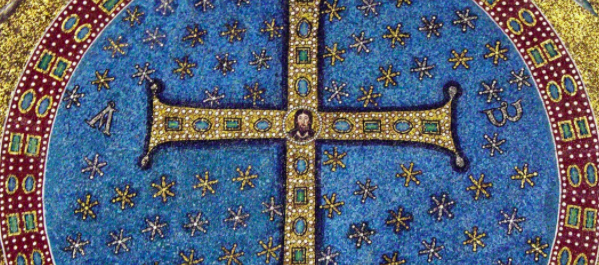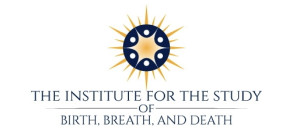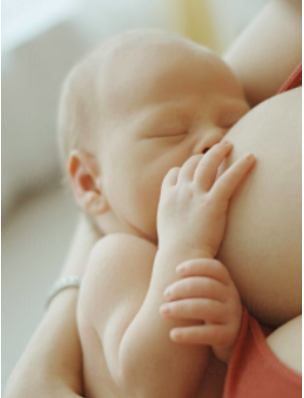The Suckling
by Alice Courtright
A moment in time but time was made through that moment:
for without the meaning there is no time,
and that moment in time gave the meaning.
~ TS. Eliot, Choruses from “The Rock”
My newborn, Caroline, turns her head and opens her mouth wide. A white film of milk residue coats the back of her tongue. It’s time to nurse again. I pull up my stained oversized t-shirt. My forefinger and thumb unclasp my bra. A damp smell of milk and sweat enters the air. The baby begins to pant. Out comes the enormous sloping breast, already swollen with milk and as large as my newborn’s head.
The sight of my heavy nursing breasts never fails to amaze me. I look down and marvel at the full breast tissue, mottled with blue veins in a lacy reticular pattern. Creamy droplets form on the tip of the nipple. A few thin, watery streams spray out and land on Caroline’s plump cheeks. She licks the rosy areola and nuzzles my warm skin.
I carefully cradle Caroline’s neck and watch her prepare to nurse. She roots and grunts, moving her tongue in and out of her mouth. I find it difficult, waiting for the baby to latch. She writhes, and I long for her to settle. I need her to suck down the milk and soften my bulging breast, which is starting to ache. I remember the advice of a midwife: Resist the urge to push the baby’s face onto your breast and force a latch. Support her neck with your hand. Allow the child to tilt her head back and open her mouth wide. Breastfeeding takes patience. The milk drips and sprays. Caroline smacks her lips. I sigh and wait. Soon, but not yet, she’ll shake her head onto the breast. Her lips will stretch outward to seal around the areola, and her mouth will be full of my flesh.
I wonder if other mammals grow frustrated, waiting for their young to nurse. Last week, I drove my three daughters up to Muscoot Farm. The entrance was decorated with purple mums and bumpy green gourds. In the corner of a wooden barn, a spotted pink sow was lying on her side, nursing a litter. Her head was thrust upward above the line of her body, curving her face away from the hungry piglets. She hardly moved, except to blink or wriggle a fly off her whiskered snout. I felt a connection to the mother pig, though she didn’t acknowledge me or any of us standing at the fence. The busy pile of piglets suckled her many teats, and I admired how still she was.
We wandered off before she was done nursing. Did the sucklings drink their fill and fall asleep? Did the mother decide she’d had enough and stand up? My daughters wanted to see the horses in a nearby paddock. The wind kicked up and a few sun-baked leaves flew around us on the dirt pathway. I moved slowly, holding hands with my older girls, the baby tied onto my chest in a cloth wrap. Margaret and Lucy chattered about their Halloween costumes, but my thoughts remained on the sow. What kind of pressure did she feel in her udder? How does she lie down without crushing one of her young?
During the day, I usually feed Caroline in the old green armchair upstairs in the nursery. At night, we lie down together. I fold a fresh navy towel in half and spread it out on the sheet. I brush my teeth and prepare to get in bed. Because I had a c-section, lying down is very complicated. First, I sit up in the bed with my legs extended. Then, I roll onto my hip and slide my hand up the sheet toward the pillow. This brings my torso down to the mattress. I’m almost ready for the baby. The towel gets bunched up when I slide down, and I have to scooch my bottom over to smooth it out. This is where I lose control. I lift my pelvis to perform the simple gesture of flattening the towel and gasp in pain. I feel like I’ve ripped open the incision from my cesarean on one side. I hastily flatten the towel beneath me and lower my hips. I catch my breath, unable to speak. My husband lays the baby beside me. She is hungry. Her round little head bobs next to my breast, and she lurches expertly toward my nipple and begins gobbling down milk.
I try to sleep between feedings. Caroline makes many noises beside me in the bed. She gurgles and whimpers, jerking her legs up and down. Drew sleeps soundly with the baby between us. He seems to be disturbed only when she really cries. Then he gets up without complaining and changes her diaper in the nursery. Caroline fusses with hunger and I can hear him cooing to her and snapping up her onesie. He appears in the doorway like an apparition and delivers her back to me. I’m dazed by these night feedings and thankful that I can stay lying down. I’m thankful to Drew for getting up and letting me rest. He touches my bare shoulder tenderly and walks around the foot of the bed to his side. Within minutes, I hear him snoring lightly and twitching. But I can’t sleep well when Caroline is beside me. I worry about smothering her, and I wonder at her sounds. She squawks and then murmurs sweetly in the dark room. I look up from watching over the baby beside me. Through the window, I see a bright half-moon. It shines into our bedroom, covering everything in a dim bluish light.
 On Sunday morning, I took Caroline to St. Matthew’s by myself for the first time. Drew is a minister there. His paternity leave ended, and he left the house early to prepare for the first service at eight. When I got there for the ten o’clock, I dropped off my older daughters at the church school classrooms. Lucy, my middle child, threw a fit and clung to my leg. I pried her off me with one hand as I balanced Caroline, who was also crying, on my other arm. I walked quickly to Drew’s office in the parish hall, closed the door, and dropped my bags. The blind wouldn’t close, so I sat with my back to the window and lifted up my dress to breastfeed Caroline before the service.
On Sunday morning, I took Caroline to St. Matthew’s by myself for the first time. Drew is a minister there. His paternity leave ended, and he left the house early to prepare for the first service at eight. When I got there for the ten o’clock, I dropped off my older daughters at the church school classrooms. Lucy, my middle child, threw a fit and clung to my leg. I pried her off me with one hand as I balanced Caroline, who was also crying, on my other arm. I walked quickly to Drew’s office in the parish hall, closed the door, and dropped my bags. The blind wouldn’t close, so I sat with my back to the window and lifted up my dress to breastfeed Caroline before the service.
Two ushers stood outside the brick church and welcomed me with a smile. One patted the baby and whispered hello while passing me a bulletin. I was late, but it didn’t matter. The church was pretty full. Some people were wearing masks, though most weren’t. I found a spot in the back pew. I’d missed the opening readings, and the Gospel hymn was underway. Caroline slept on my chest, and I rocked her back and forth, singing quietly.
Thou spread’st a table in my sight,
Thy unction, grace bestoweth:
And O what transport of delight
From thy pure chalice floweth!
Later, the usher reached into my box pew and tapped me lightly on the shoulder. I realized it was already my turn to go up and receive communion. I’d been absorbed in keeping Caroline quiet. She sucked on my pinky finger as I stood up and walked toward the altar. I waited for a space to open up at the circular railing. Drew and the rector, John, moved slowly in their vestments, distributing wafers to the people. I knelt down on the needlepoint cushion and put my one free hand over the railing to receive the bread.
“The Body of our Lord Jesus Christ, which was given for thee,” John said to the older man next to me, placing the bread in his open palm. The man’s eyes were closed, and he kept his head down. I watched his wrinkled hand close over the wafer. “…preserve thy body and soul unto everlasting life.” I was next. “Take and eat this in remembrance that Christ died for thee,” John said. The white wafer was almost weightless in my hand. “…and feed on him in thy heart by faith, with thanksgiving.” John made the sign of the cross on Caroline’s forehead and gave her a blessing. She tussled on my chest and settled down again. Her tongue fluttered against my pinky.
I went alone to my six-week postpartum checkup. The nurse took note of my weight and blood pressure and then pointed to a pink gown on the examination table. “Please undress completely, and put the gown on open to the front,” she said. “Dr. Cape will be in to see you soon.” I folded my shirt and pants neatly on a chair, leaving my socks on. I took off my bra and felt the cool air of the sterile room on my breasts. They started to tingle and throb. The milk was letting down. I looked in my purse, but I hadn’t packed a burp cloth. On the wall, there was a paper towel dispenser. I pulled out two sheets. They were stiff and coarse. I put one on each breast. The milk poured out and the paper towels soaked it up. I thought about Caroline. Often, when I am apart from her in the house and my milk comes in, I hear her crying in the nursery to be fed. The timing is always startling. I looked down at the soggy paper towels in my hands and missed holding my soft, beautiful baby. Was she waking up to eat now?
Dr. Cape massaged each of my breasts a few times, checking for suspicious lumps. “What I tell my patients,” she said, “is there’s a happy medium between ignoring everything and freaking out about everything.” I nodded. “I just had a letdown,” I said. “I’ve only felt lumpiness when the breasts are full like this. When they’re empty of milk, they seem totally soft.” Dr. Cape finished the examination and sat back on the stool. “Everything looks normal,” she said, adjusting her white coat. “How are the big sisters doing?” She asked if I’d had any depression and confirmed my plans for birth control. I answered her short, objective questions with too much information. I wanted to show her I was doing well and that Caroline, whom she delivered, was thriving. I felt a tremendous gratitude to her for delivering my baby safely and I planned on inviting her to Caroline’s baptism in the spring. We looked at each other over our masks. How much could she read in my eyes? How much could I read in hers? She wore round tortoise-shell glasses. Her expression seemed kindly, but detached.
In the afternoon, I put Caroline in the stroller and take a walk. The road loops around our neighborhood. The sun is bright and the wind is strong and warm. Leaves are falling continuously. I lean over a few times to put Caroline’s pacifier back in. I know she is my last baby, and every moment with her carries a sense of ending. She falls asleep just as we are getting home.
Across the street from our driveway, there is an old red maple. It’s about three times as tall as our neighbor’s house. The tree has already lost its upper leaves, and the top branches are bare against the clear blue sky. But the middle of the maple is still thick with golden foliage. The heavy branches sway in the wind, and sunlight shimmers on the leaves.
I think about Caroline’s birth often. Nothing went as expected. The baby was breech and tangled up in her cord. The heartbeat was lost. I remember Dr. Cape standing in front of me as I sat on the operating table. The baby was in distress. Behind me, two anesthesiologists prepared a spinal block. “Hunch forward,” Dr. Cape said. I looked up at her, my eyes full of tears. She put her forehead on my forehead.
 During the birth, Mom’s sister, my Aunt Charley, was praying down in Asheville for me and the baby. She walked out onto her porch and faced the Blue Ridge Mountains. She opened her arms wide to the hills and tilted her head back into the sun. “I felt the calming spirit of my mom,” she wrote to me later. “I knew everything was going to be alright.”
During the birth, Mom’s sister, my Aunt Charley, was praying down in Asheville for me and the baby. She walked out onto her porch and faced the Blue Ridge Mountains. She opened her arms wide to the hills and tilted her head back into the sun. “I felt the calming spirit of my mom,” she wrote to me later. “I knew everything was going to be alright.”
My grandmother died a few years ago from Alzheimer’s. I called her Grams. Before she got sick, she woke up early every morning. She wore a long silk bathrobe over her nightgown and sat on the same end of the red couch. She drank coffee out of a blue china teacup and read the daily scripture. The white margins of her Bible were worn. I never asked her when she began her morning prayer practice and why. Perhaps her own mother did it. Perhaps it gave her hope. Grams raised five children while my grandpa was overseas in the army. They lost their firstborn in a drowning.
I loved being near my grandmother. I loved the smell of her French perfume and how cheerfully she answered the phone. She played Chopin on her upright piano and sang loudly in church. She was devoted to my grandfather. He was holding her hand when she died in her sleep. We held her service on a hillside, overlooking a small lake. We read her favorite passage from Philippians:
Finally, beloved, whatever is true, whatever is honorable, whatever is just, whatever is pure, whatever is pleasing, whatever is commendable, if there is any excellence and if there is anything worthy of praise, think about these things. Keep on doing the things that you have learned and received and heard and seen in me, and the God of peace will be with you.
In the middle of the prayers, a Canada goose floated across the lake, followed by five gray goslings. We watched silently as they slowly crossed the water together. My sister reached over and held my hand. We made meaning out of the scene. The water rippled behind the geese as they paddled along. The goose and her young waddled out onto the far shore and disappeared under the tall pine trees.
Caroline was up every two hours last night, and I’m exhausted. I sit on the couch with the baby on my chest, listening to the rain against the windows. What will I remember from this fragile time? I’m trying to soak it all in. I remember sitting in this same spot a few short months ago, the baby kicking in my womb. I’d perch a cup of tea on my giant belly and ask Drew to rub my feet. The seasons have changed, and Caroline is here. Already, my incision has healed. I no longer bleed from the birth, and my baby is eight weeks old. She can bring her delicate little fingers to her mouth now. She coos at me when I talk to her. I love you, baby Caroline. I love you so much. She opens her dark blue eyes wide. One side of her lip curls upward into a slight smile.
When she falls asleep in my arms, I lean back and watch the rain streaking down the windows. I have a thought: this is a holy time. Outside, a tree sparrow hops around in the rhododendron, sheltering in the bush from the rain. Margaret and Lucy are off at school, and the house is quiet. I feel a bit chilly and pull a fleece blanket over my lap. My eyes begin to close. The rain is the only sound I hear, tapping on the glass. It reminds me of a canticle from Morning Prayer:
For as rain and snow fall from the heavens
and return not again, but water the earth,
Bringing forth life and giving growth,
seed for sowing and bread for eating,
So is my word that goes forth from my mouth;
it will not return to me empty;
But it will accomplish that which I have purposed,
and prosper in that for which I sent it.
 Alice Courtright is a writer who lives in New York. She studied English Literature at Yale University before attending seminary in Sewanee, Tennessee. She served as a school chaplain in New Hampshire for five years. She lives with her husband and three young daughters.
Alice Courtright is a writer who lives in New York. She studied English Literature at Yale University before attending seminary in Sewanee, Tennessee. She served as a school chaplain in New Hampshire for five years. She lives with her husband and three young daughters.

